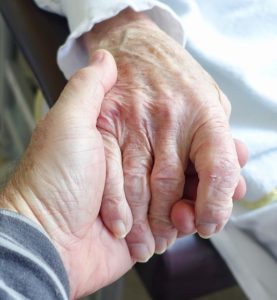Dementia Care During COVID-19
 The COVID-19 pandemic has required that senior care facilities change their policies and daily operations, and that’s been a challenge for both staff and residents. Social distancing, the restriction of family and friend visits, and the increased use of PPE has made for some dramatic changes in the daily lives of residents and staff.
The COVID-19 pandemic has required that senior care facilities change their policies and daily operations, and that’s been a challenge for both staff and residents. Social distancing, the restriction of family and friend visits, and the increased use of PPE has made for some dramatic changes in the daily lives of residents and staff.
These changes can be particularly challenging when providing dementia care, and that has required facilities to adapt and tailor their safety procedures to best support their residents’ needs.
Challenges of Dementia Care During the Pandemic
Implementing PPE and social distancing while caring for residents with dementia brings its own set of challenges.
Kena Phillips, Regional Director of Operations for Sunshine Retirement Living, explains that the business overcame multiple obstacles when implementing these practices. Phillips notes that receive supplier PPE shortages made receiving increased PPE orders early on a challenge. Explaining to memory care residents why they needed to isolate was also difficult.
“We came up with a plan early on that greatly reduced resident exposure to outside visitors, which helped to ensure their safety and allowed them to be able to maintain some measure of freedom to interact with other residents in a socially distant way,” she notes. “We also eliminated group activities and focused on interacting with our residents one-on-one and in safe, socially distant pairs.”
Addressing the facility’s safety on a whole also served to help keep memory care residents safe. Sunshine Retirement Living took the initiative early on to have staff members change the clothes they had worn out in the community before interacting with residents. This measure helps to ensure that staff clothing didn’t bring in any outside exposure.
Also, multiple Sunshine communities have recently invested in ionized air filtering systems by Air Knight. “They have been proven in studies to reduce COVID-19 and Staphylococcus pathogens, improve air quality, and safely remove allergens and irritants,” notes Phillips.
Establishing Normalcy for Residents
During a time of uncertainty, establishing a sense of normalcy for residents becomes an essential element of a COVID-19 prevention plan. Sunshine Retirement Living addressed this need in multiple ways.
“One activity that has resonated well with residents is the use of Oculus VR headsets with special software programs,” says Phillips. “Our residents can choose from a variety of virtual experiences which can help uncover fond and distant memories or improve socialization when participating with others. Popular armchair travel at Sunshine communities include going on an African safari, swimming with sharks, sky diving, visiting the Cleveland Zoo and San Diego Zoo, driving down Route 66, and touring the White House.”
In addition to virtual reality, the communities implemented Google Handouts, Microsoft Teams, Zoom, Facetime, and other technologies to help residents maintain their connections with families. “We often record these interactions so that when a resident becomes anxious, we can play back the virtual visit for them,” says Phillips. Sunshine communities have asked that families bring in photo albums. They have also instituted window visits and outdoor socially distant visits when possible. Extra staff have been hired to sanitize between those outdoor visits.
“Originally piloted at Copper Canyon Memory Care in Tucson, Arizona, we are also rolling out new Sunshine Sensory Spas in our memory care communities,” says Phillips. “The sensory spas feature stimulation therapies that help encourage emotions and reveal memories in those experiencing dementia and Alzheimer’s disease. We’ve invested in these sensory experiences for their proven mood-boosting effects, such as relaxation rooms with sound baths for calming meditations and weighted blankets.”
Memory care patients have unique care needs. By adjusting COVID-19 prevention measures and identifying additional ways to support memory care residents, facilities can help to protect residents physically while also ensuring their mental and emotional needs are met.

Paige Cerulli is a contributing writer to i Advance Senior Care.
Related Articles
Topics: Alzheimer's/Dementia , Featured Articles , Technology & IT











